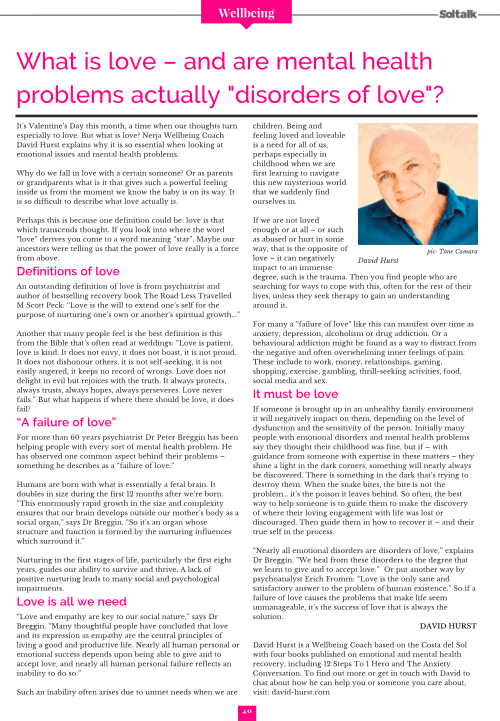What is love – and are mental health problems actually “disorders of love”?

Why do we fall in love with a certain someone? Or as parents or grandparents what is it that gives such a powerful feeling inside us from the moment we know the baby is on its way. It is so difficult to describe what love actually is.
Perhaps this is because one definition could be: love is that which transcends thought. If you look into where the word “love” derives you come to a word meaning “star”. Maybe our ancestors were telling us that the power of love really is a force from above.
Definitions of love
An outstanding definition of love is from psychiatrist and author of bestselling recovery book The Road Less Traveled M Scott Peck: “Love is the will to extend one’s self for the purpose of nurturing one’s own or another’s spiritual growth…”
Another that many people feel is the best definition is this from the Bible that’s often read at weddings: “Love is patient, love is kind. It does not envy, it does not boast, it is not proud. It does not dishonor others, it is not self-seeking, it is not easily angered, it keeps no record of wrongs. Love does not delight in evil but rejoices with the truth. It always protects, always trusts, always hopes, always perseveres. Love never fails.”
But what happens if where there should be love, it does fail?
“A failure of love”
For more than 60 years psychiatrist Dr Peter Breggin has been helping people with every sort of mental health problem. He has observed one common aspect behind their problems – something he describes as a “failure of love”.
Humans are born with what is essentially a fetal brain. It doubles in size during the first 12 months after we’re born. “This enormously rapid growth in the size and complexity ensures that our brain develops outside our mother’s body as a social organ,” says Dr Breggin. “So it’s an organ whose structure and function is formed by the nurturing influences which surround it.”
Nurturing in the first stages of life, particularly the first eight years, guides our ability to survive and thrive. A lack of positive nurturing leads to many social and psychological impairments.
Love is all we need
“Love and empathy are key to our social nature,” says Dr Breggin. “Many thoughtful people have concluded that love and its expression as empathy are the central principles of living a good and productive life. Nearly all human personal or emotional success depends upon being able to give and to accept love, and nearly all human personal failure reflects an inability to do so.”
Such an inability often arises due to unmet needs when we are children. Being and feeling loved and loveable is a need for all of us, perhaps especially in childhood when we are first learning to navigate this new mysterious world that we suddenly find ourselves in.
If we are not loved enough or at all – or such as abused or hurt in some way, that is the opposite of love – it can negatively impact to an immense degree, such is the trauma. Then you find people who are searching for ways to cope with this, often for the rest of their lives, unless they seek therapy to gain an understanding around it.
For many a “failure of love” like this can manifest over time as anxiety, depression, alcoholism or drug addiction. Or a behavioural addiction might be found as a way to distract from the negative and often overwhelming inner feelings of pain. These include to work, money, relationships, gaming, shopping, exercise, gambling, thrill-seeking activities, food, social media and sex.
It must be love
If someone is brought up in an unhealthy family environment it will negatively impact on them, depending on the level of dysfunction and the sensitivity of the person. Initially many people with emotional disorders and mental health problems say they thought their childhood was fine, but if – with guidance from someone with expertise in these matters – they shine a light in the dark corners, something will nearly always be discovered.
There is something in the dark that’s trying to destroy them. When the snake bites, the bite is not the problem… it’s the poison it leaves behind. So often, the best way to help someone is to guide them to make the discovery of where their loving engagement with life was lost or discouraged. Then guide them in how to recover it – and their true self in the process.
“Nearly all emotional disorders are disorders of love,” explains Dr Breggin. “We heal from these disorders to the degree that we learn to give and to accept love.”
Or put another way by psychoanalyst Erich Fromm: “Love is the only sane and satisfactory answer to the problem of human existence.” So if a failure of love causes the problems that make life seem unmanageable, it’s the success of love that is always the solution.
My latest article for Soltalk magazine: http://www.soltalk.com

